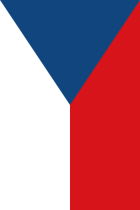
Czechoslovakia was a landlocked state in Central Europe, created in 1918, when it declared its independence from Austria-Hungary. In 1938, after the Munich Agreement, the Sudetenland became part of Nazi Germany, while the country lost further territories to Hungary and Poland. Between 1939 and 1945, the state ceased to exist, as Slovakia proclaimed its independence and Carpathian Ruthenia became part of Hungary, while the German Protectorate of Bohemia and Moravia was proclaimed in the remainder of the Czech Lands. In 1939, after the outbreak of World War II, former Czechoslovak President Edvard Beneš formed a government-in-exile and sought recognition from the Allies.

The Czechs, or the Czech people, are a West Slavic ethnic group and a nation native to the Czech Republic in Central Europe, who share a common ancestry, culture, history, and the Czech language.

The flag of the Czech Republic is the same as the flag of the former Czechoslovakia. Upon the dissolution of Czechoslovakia in December 1992, the Czech Republic kept the Czechoslovak flag while Slovakia adopted its own flag. The first flag of Czechoslovakia was based on the flag of Bohemia and was white over red. This was almost identical to the flag of Poland, so a blue triangle was added at the hoist in 1920. The flag was banned by the Nazis in 1939 as they established a government nominally in control of Bohemia and Moravia, and a horizontal tricolour of white, red, and blue was used for the duration of the war. The 1920–1939 flag was restored in 1945.

Peter Šťastný, also known colloquially as "Peter the Great" and "Stosh", is a Slovak-Canadian former professional ice hockey player and politician who played in the National Hockey League (NHL) from 1980 to 1995. Šťastný is the second-highest scorer of the 1980s, after Wayne Gretzky. During his time with the Quebec Nordiques, Šťastný became a Canadian citizen. From 2004 to 2014, he served as a Member of the European Parliament for Slovakia. During his NHL career, he played with the Quebec Nordiques, New Jersey Devils, and St. Louis Blues.

Ludvík Svoboda was a Czech general and politician. He fought in both World Wars, for which he was regarded as a national hero, and he later served as the president of Czechoslovakia from 1968 to 1975.

The Slovakia men's national ice hockey team is the national ice hockey team of Slovakia and is controlled by the Slovak Ice Hockey Federation. A successor to the Czechoslovakia national team, it is one of the most successful national ice hockey teams in the world. The team's general manager is Miroslav Šatan and their head coach is Craig Ramsay.

The Czech Republic men's national ice hockey team is the national ice hockey team of the Czech Republic. Since 2021, the team has been officially known in English as Czechia. It is one of the most successful national ice hockey teams in the world and a member of the so-called "Big Six", the unofficial group of the six strongest men's ice hockey nations, along with Canada, Finland, Russia, Sweden and the United States. It is governed by the Czech Ice Hockey Association. The Czech Republic has 85,000 male players officially enrolled in organized hockey.

Největší Čech is the Czech spin-off of the BBC Greatest Britons show; a television poll of the populace to name the greatest Czech in history. The series was broadcast by the national public-service broadcaster, Czech Television. The presenter of the programme was Marek Eben, who was also nominated to be in the Top 100; however, since he was presenting the show he was not eligible to be included in the final list.

Jaroslav Drobný was a world No. 1 amateur tennis and ice hockey champion. He left Czechoslovakia in 1949 and travelled as an Egyptian citizen before becoming a citizen of the United Kingdom in 1959, where he died in 2001. In 1951, he became the first and, to date, only player with African citizenship to win the French Open, while doing likewise at the Wimbledon Championships in 1954. He was inducted into the International Tennis Hall of Fame in 1983. He played internationally for the Czechoslovakia men's national ice hockey team, and was inducted in the International Ice Hockey Federation Hall of Fame.

The Czechoslovakia national basketball team represented Czechoslovakia in international basketball from 1932 to 1992. After the Dissolution of Czechoslovakia in 1993, the Czech Republic and Slovakia set up their own national teams. Both teams are recognized as the successor to the Czechoslovak team.

HC Dynamo Pardubice is a professional ice hockey club that plays in the Czech Extraliga. Its home venue is Enteria arena located in Pardubice. The club was originally named LTC Pardubice, acquiring its current name at the start of the 2015–16 season.

The Czech Republic competed at the 1994 Winter Olympics in Lillehammer, Norway. It was the first Winter Games since the dissolution of Czechoslovakia, and so the Czech Republic and Slovakia competed as independent teams.

Czechoslovakia competed at the 1956 Summer Olympics in Melbourne, Australia. 63 competitors, 51 men and 12 women, took part in 54 events in 10 sports.
František is a masculine given name of Czech origin. It is a cognate of Francis, Francisco, François, and Franz. People with the name include:

The Czech Ice Hockey Association, also known by the shortened name Czech Ice Hockey, is the governing body of ice hockey and sledge hockey in Czechia. It is a member of the International Ice Hockey Federation (IIHF) and controls the majority of organized ice hockey in the Czech Republic.
The Czechoslovak Basketball League was the highest level professional club basketball competition for men in Czechoslovakia. Its successor national league in the Czech Republic became the Mattoni NBL, and its successor national league in Slovakia became the Extraliga.

The National Bank of Czechoslovakia was the central bank of Czechoslovakia between 1926 and 1939, succeeding the Austro-Hungarian Bank after a 6-year interval during which central banking functions were assumed directly by the country’s ministry of finance.


















